Watched September 17 - 23, 2007: Ôtani, Tian and Hanawa
Rough (Kentarô Ôtani, 2006)
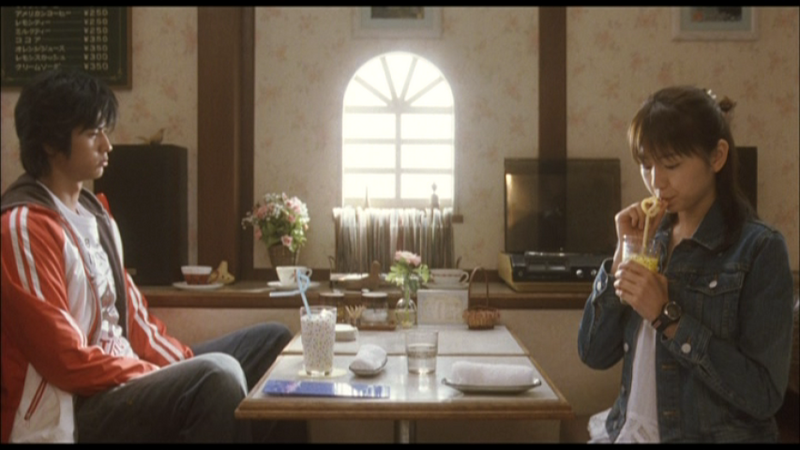 An amiable enough adaptation of a 1980s sports manga by Mitsuru Adachil, about high school swimmers (and divers) -- though not quite so successful as Isshin Inudo's adaptation of Adachi's baseball manga Touch from 2005. The story here seems a bit too sketchy and a bit rushed -- and supporting characters who seem like they should play important roles come across like vestiges of what they should have been. Despite these problems, this film is worth seeing -- assuming one is interested in Japanese commercial cinema (and not just art films).
An amiable enough adaptation of a 1980s sports manga by Mitsuru Adachil, about high school swimmers (and divers) -- though not quite so successful as Isshin Inudo's adaptation of Adachi's baseball manga Touch from 2005. The story here seems a bit too sketchy and a bit rushed -- and supporting characters who seem like they should play important roles come across like vestiges of what they should have been. Despite these problems, this film is worth seeing -- assuming one is interested in Japanese commercial cinema (and not just art films).
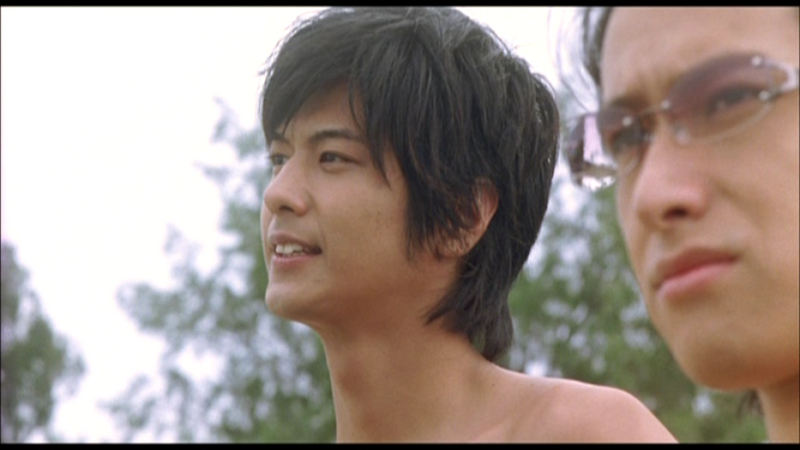 The central pair here are a talented (but a bit careless and indolent) swimmer played by Mokomichi Hayami and a diver played by Masami Nagasawa. Their first encounter at the summer-time (residential) sports program mystifies Hayami -- as Nagasawa calls him "murderer" for no apparent reason. As it turns out, the explanation lies in the pair's family histories. Fate throws the two together --
The central pair here are a talented (but a bit careless and indolent) swimmer played by Mokomichi Hayami and a diver played by Masami Nagasawa. Their first encounter at the summer-time (residential) sports program mystifies Hayami -- as Nagasawa calls him "murderer" for no apparent reason. As it turns out, the explanation lies in the pair's family histories. Fate throws the two together -- 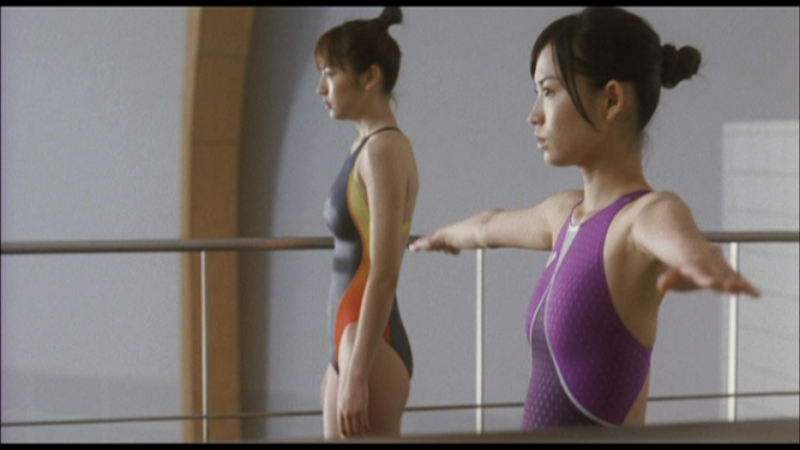 but Nagasawa clearly also has a long-standing crush (at least) on an older swimmer (Tsuyoshi Abe) who has been her neighbor and mentor since childhood. Meanwhile, another diver (Yui Ichikawa) nurses a seemingly hopeless passion for Hayami. The strength of the film is that the two leads play relatively unstereotyped characters -- and play them quite well. The supporting cast is mostly quite good, insofar as they have (limited) parts to play. Cinematography here is mostly functional -- professional, but nothing out of the ordinary, certainly not as striking as that in Otani's prior Nana.
but Nagasawa clearly also has a long-standing crush (at least) on an older swimmer (Tsuyoshi Abe) who has been her neighbor and mentor since childhood. Meanwhile, another diver (Yui Ichikawa) nurses a seemingly hopeless passion for Hayami. The strength of the film is that the two leads play relatively unstereotyped characters -- and play them quite well. The supporting cast is mostly quite good, insofar as they have (limited) parts to play. Cinematography here is mostly functional -- professional, but nothing out of the ordinary, certainly not as striking as that in Otani's prior Nana.
More captures:
http://i9.photobucket.com/albums/a59/mkerpan/sept_07/rough02.png
http://i9.photobucket.com/albums/a59/mkerpan/sept_07/rough04.png
http://i9.photobucket.com/albums/a59/mkerpan/sept_07/rough05.png
http://i9.photobucket.com/albums/a59/mkerpan/sept_07/rough08.png
http://i9.photobucket.com/albums/a59/mkerpan/sept_07/rough10.png
Wu Qingyuan / The Go Master (TIAN Zhuangzhuang, 2006)
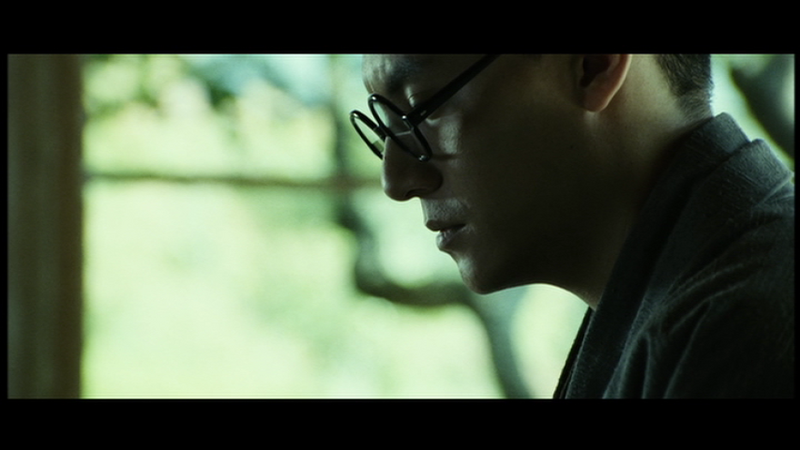 Tian's film is absolutely gorgeous and it involves a potentially fascinating subject -- the life in Japan (of the late 20s through the early 60s) of one of the greatest Chinese go players, WU Qingyuan (called GO Seigen in Japanese). The cast here is also uniformly fine. Nonetheless the film did not quite work for either me or my go-playing children. The problem here, like that in the slighter Rough discussed above is one of over-compression.
Tian's film is absolutely gorgeous and it involves a potentially fascinating subject -- the life in Japan (of the late 20s through the early 60s) of one of the greatest Chinese go players, WU Qingyuan (called GO Seigen in Japanese). The cast here is also uniformly fine. Nonetheless the film did not quite work for either me or my go-playing children. The problem here, like that in the slighter Rough discussed above is one of over-compression. 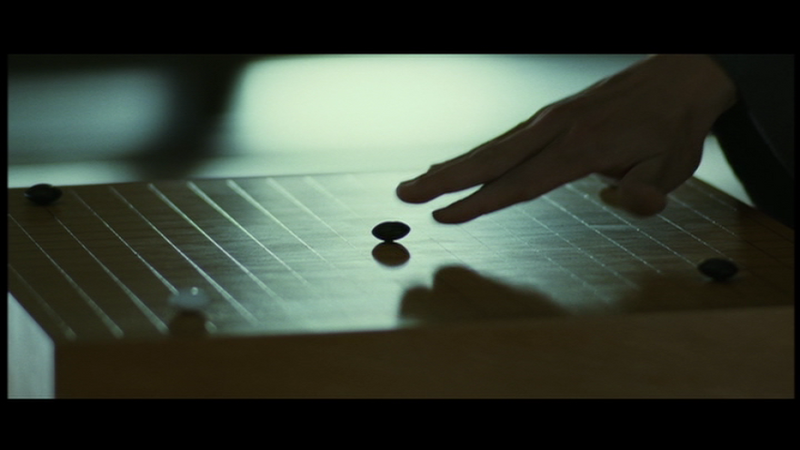 One simply cannot condense an almost 40 year career -- and give a sense of what the game of go is about -- in a movie clocking in at a mere 104 minutes. What one is left with is a set of very lovely (but largely disconnected) visual haiku. The film barely touches on Go's years as a child prodigy, then skips through his career in Japan, particularly depicting his distress as war between his homeland and his adopted country loomed (and then exploded).
One simply cannot condense an almost 40 year career -- and give a sense of what the game of go is about -- in a movie clocking in at a mere 104 minutes. What one is left with is a set of very lovely (but largely disconnected) visual haiku. The film barely touches on Go's years as a child prodigy, then skips through his career in Japan, particularly depicting his distress as war between his homeland and his adopted country loomed (and then exploded).  For all the brevity of the film as a whole, it perhaps spends a bit too much time on Go's post-war flirtation with a religious cult. In any event, CHANG Chen is excellent as Go (once one gets past the boyhood prologue). One wonders if Tian originally envisioned this film as a much longer work. It is conceivable that, in this case, more might have been more.
For all the brevity of the film as a whole, it perhaps spends a bit too much time on Go's post-war flirtation with a religious cult. In any event, CHANG Chen is excellent as Go (once one gets past the boyhood prologue). One wonders if Tian originally envisioned this film as a much longer work. It is conceivable that, in this case, more might have been more.
More pictures:
http://i9.photobucket.com/albums/a59/mkerpan/sept_07/go01.png
http://i9.photobucket.com/albums/a59/mkerpan/sept_07/go04.png
http://i9.photobucket.com/albums/a59/mkerpan/sept_07/go05.png
http://i9.photobucket.com/albums/a59/mkerpan/sept_07/go06.png
http://i9.photobucket.com/albums/a59/mkerpan/sept_07/go07.png
http://i9.photobucket.com/albums/a59/mkerpan/sept_07/go08.png
http://i9.photobucket.com/albums/a59/mkerpan/sept_07/go09.png
http://i9.photobucket.com/albums/a59/mkerpan/sept_07/go11.png
http://i9.photobucket.com/albums/a59/mkerpan/sept_07/go12.png
http://i9.photobucket.com/albums/a59/mkerpan/sept_07/go13.png
http://i9.photobucket.com/albums/a59/mkerpan/sept_07/go14.png
Hatsukoi / First Love (Yukinari Hanawa, 2006)
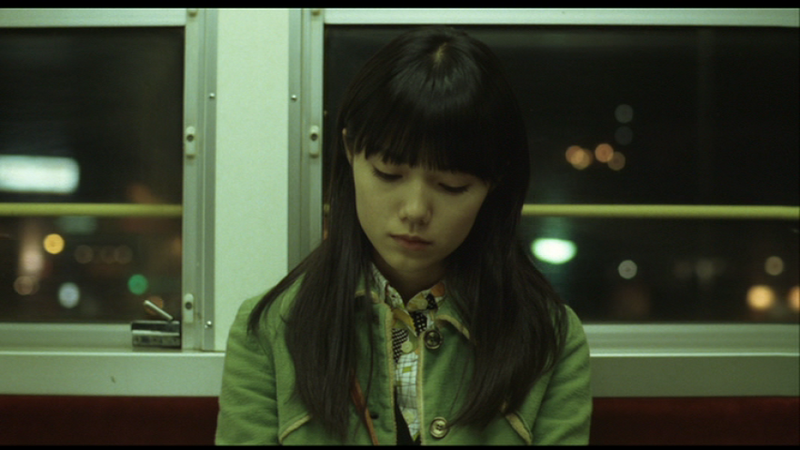 In 1968, daring thieves pulled off a violence-free theft of 300,000,000 yen. The police never solved this crime -- and even after the statute of limitation ran, not a single stolen yen ever showed up. Neither did anyone acknowledge involvement with the crime -- until around 30 years later, when Misuzu Nakahara published an "autobiography" claiming she was one of the key figures in the heist (when she was still a high school student). Hanawa's film dramatizes Nakahara's story -- with Aoi Miyazaki in the central role.
In 1968, daring thieves pulled off a violence-free theft of 300,000,000 yen. The police never solved this crime -- and even after the statute of limitation ran, not a single stolen yen ever showed up. Neither did anyone acknowledge involvement with the crime -- until around 30 years later, when Misuzu Nakahara published an "autobiography" claiming she was one of the key figures in the heist (when she was still a high school student). Hanawa's film dramatizes Nakahara's story -- with Aoi Miyazaki in the central role.
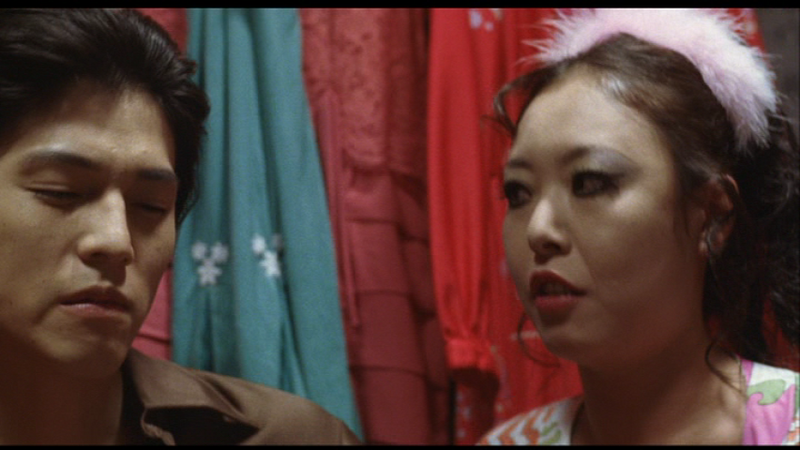 The film (primarily) covers the period of 1966 through 1969 -- beginning with Misuzu's reunion with her older brother Ryo (played by Aoi Miyazaki's real older brother, Masaru). As it turns out, her mother and brother had disappeared years previously -- and Misuzu had wound up in the care of an aunt and uncle.
The film (primarily) covers the period of 1966 through 1969 -- beginning with Misuzu's reunion with her older brother Ryo (played by Aoi Miyazaki's real older brother, Masaru). As it turns out, her mother and brother had disappeared years previously -- and Misuzu had wound up in the care of an aunt and uncle. 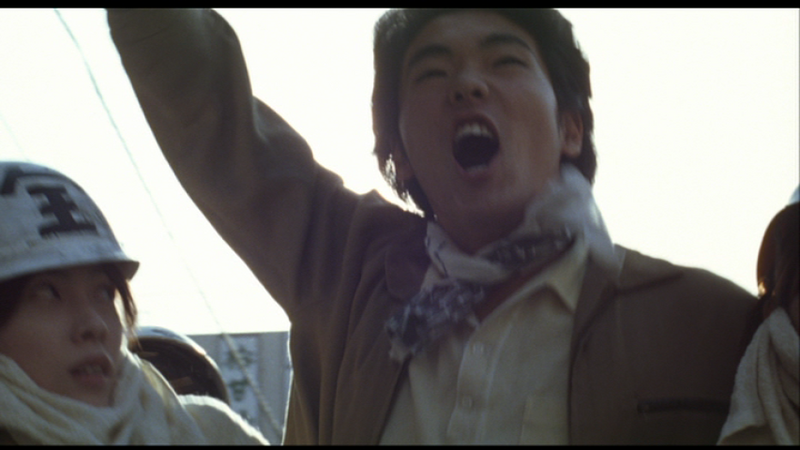 Feeling estranged from these relatives, she jumps at the chance to (secretly) associate with Ryo's bohemian, student-activist friends. As it happens, around this time, Japan's colleges became particularly turbulent around this same time, and Ryo and his band became swept up in the violence (though Misuzu manages to stay clear).
Feeling estranged from these relatives, she jumps at the chance to (secretly) associate with Ryo's bohemian, student-activist friends. As it happens, around this time, Japan's colleges became particularly turbulent around this same time, and Ryo and his band became swept up in the violence (though Misuzu manages to stay clear). 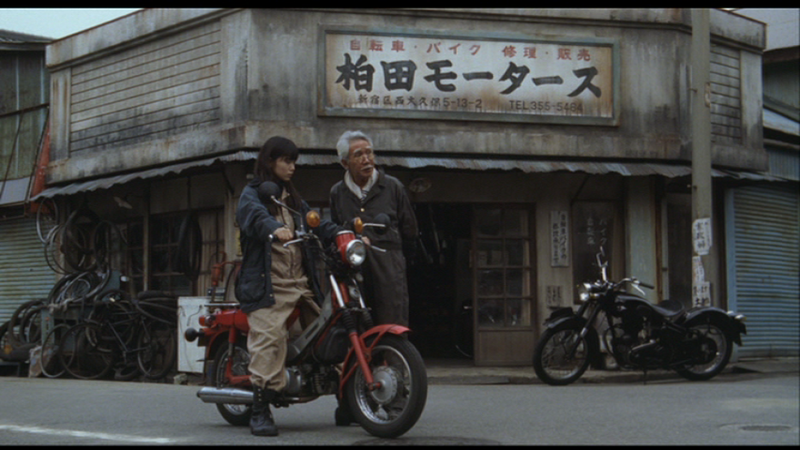 One of Ryo's friends, Kishi (Keisuke Koide) comes up with his own plan for getting back at those in power, pulling off a huge robbery. The only person he shares this plan with is Misuzu, as she is the only one of the group who is not already known to the police. In furtherance of this plan, Misuzu needs to master motorcycle riding (something she knows nothing about) and driving cars (for which she has no license).
One of Ryo's friends, Kishi (Keisuke Koide) comes up with his own plan for getting back at those in power, pulling off a huge robbery. The only person he shares this plan with is Misuzu, as she is the only one of the group who is not already known to the police. In furtherance of this plan, Misuzu needs to master motorcycle riding (something she knows nothing about) and driving cars (for which she has no license). 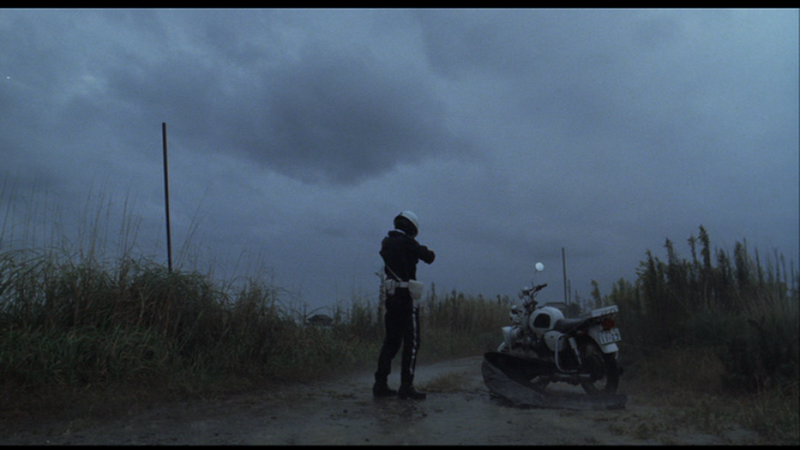 After thorough rehearsals, and despite an array of unexpected problems, Misuzu manages to carry out Kishi's plan -- pretending to be a motorcycle police officer advising the occupants of the vehicle full of money to evacuate it because it had a bomb attached underneath -- and then jumping in herself and simply driving away. Unfortunately, success turns out not to have any real satisfaction for Misuzu and Kishi (who have developed strong feelings for each other, but never really acknowledged them).
After thorough rehearsals, and despite an array of unexpected problems, Misuzu manages to carry out Kishi's plan -- pretending to be a motorcycle police officer advising the occupants of the vehicle full of money to evacuate it because it had a bomb attached underneath -- and then jumping in herself and simply driving away. Unfortunately, success turns out not to have any real satisfaction for Misuzu and Kishi (who have developed strong feelings for each other, but never really acknowledged them).
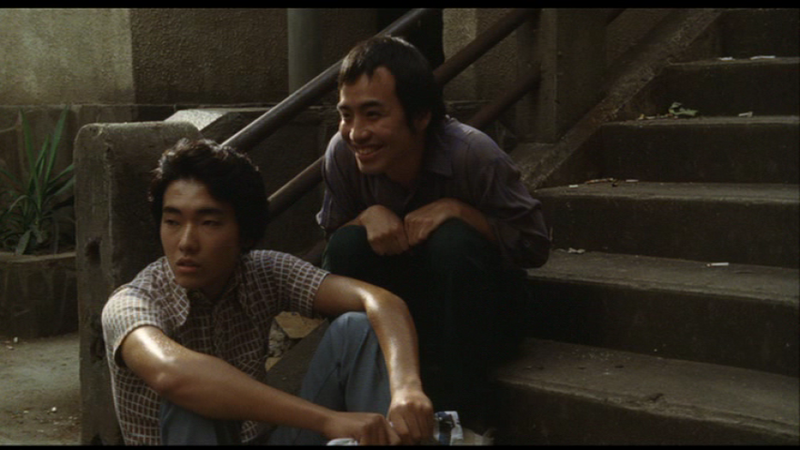 The early part of this film does a wonderful job of evoking the feel of the 60s -- and is almost certainly indebted (at least in part) to French nouvelle vague cinema. Indeed, Misuzu seems to develop a taste for artsy foreign films. While we never see what Misuzu watches, we hear bits of both a French film (not yet identified by me) and a Swedish one (surely something by Bergman).
The early part of this film does a wonderful job of evoking the feel of the 60s -- and is almost certainly indebted (at least in part) to French nouvelle vague cinema. Indeed, Misuzu seems to develop a taste for artsy foreign films. While we never see what Misuzu watches, we hear bits of both a French film (not yet identified by me) and a Swedish one (surely something by Bergman). 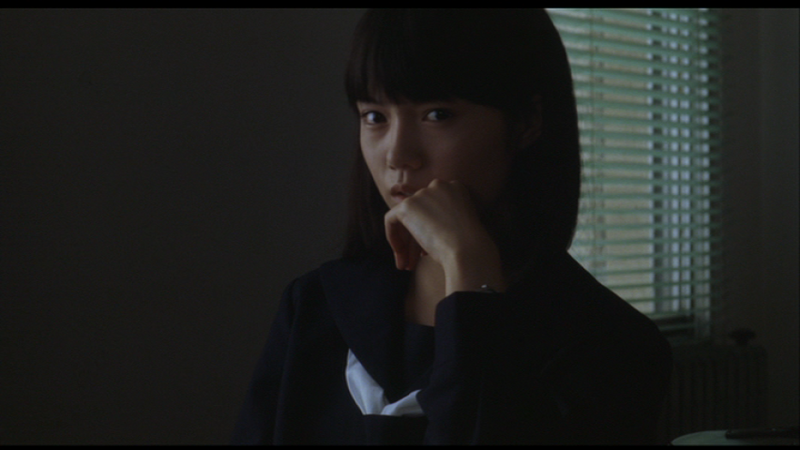 The cinematography by veteran Junichi Fujisawa (Who's Camus Anyway?, The Cherry Orchard) is quite good (but tends to the darkish side). The pacing, though slow, is steady. The story is well-told until a bit of faltering right before the end. But what what really makes the film most worthy of seeing is the superb performance of Aoi Miyazaki. Like her fabled predecessor Setsuko Hara. Miyazaki's chief assets are her large and very expressive eyes -- and her ability to carry sustained scenes with little or no need to talk.
The cinematography by veteran Junichi Fujisawa (Who's Camus Anyway?, The Cherry Orchard) is quite good (but tends to the darkish side). The pacing, though slow, is steady. The story is well-told until a bit of faltering right before the end. But what what really makes the film most worthy of seeing is the superb performance of Aoi Miyazaki. Like her fabled predecessor Setsuko Hara. Miyazaki's chief assets are her large and very expressive eyes -- and her ability to carry sustained scenes with little or no need to talk. 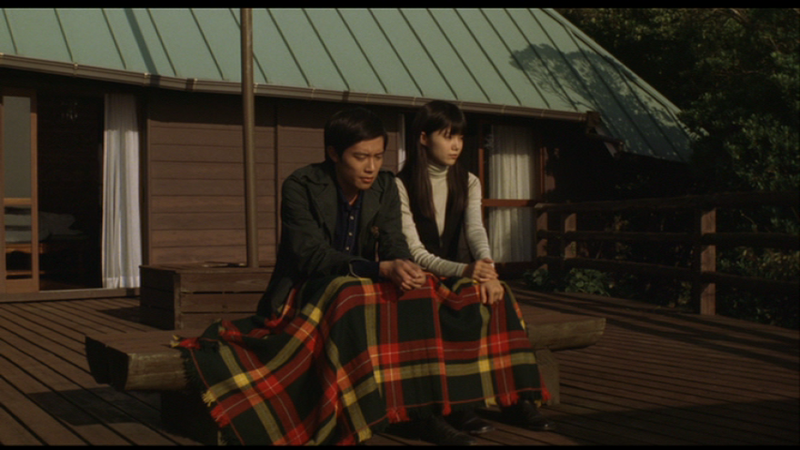 As have directors in other recent outings by Miyazaki (viz. Su-ki-da), Hanawa found that he could entrust noticeably longer takes to scenes dominated by Miyazaki than to any of the other cast members. Miyazaki continues to show promse of becoming as fine an actress as an adult as she was as a child. And Hanawa's first directorial outing shows more than enough promise to keep an eye for his future projects.
As have directors in other recent outings by Miyazaki (viz. Su-ki-da), Hanawa found that he could entrust noticeably longer takes to scenes dominated by Miyazaki than to any of the other cast members. Miyazaki continues to show promse of becoming as fine an actress as an adult as she was as a child. And Hanawa's first directorial outing shows more than enough promise to keep an eye for his future projects.
More screen shots:
http://i9.photobucket.com/albums/a59/mkerpan/sept_07/hatsukoi04.png
http://i9.photobucket.com/albums/a59/mkerpan/sept_07/hatsukoi07.png
http://i9.photobucket.com/albums/a59/mkerpan/sept_07/hatsukoi11.png
http://i9.photobucket.com/albums/a59/mkerpan/sept_07/hatsukoi12.png
http://i9.photobucket.com/albums/a59/mkerpan/sept_07/hatsukoi13.png
 An amiable enough adaptation of a 1980s sports manga by Mitsuru Adachil, about high school swimmers (and divers) -- though not quite so successful as Isshin Inudo's adaptation of Adachi's baseball manga Touch from 2005. The story here seems a bit too sketchy and a bit rushed -- and supporting characters who seem like they should play important roles come across like vestiges of what they should have been. Despite these problems, this film is worth seeing -- assuming one is interested in Japanese commercial cinema (and not just art films).
An amiable enough adaptation of a 1980s sports manga by Mitsuru Adachil, about high school swimmers (and divers) -- though not quite so successful as Isshin Inudo's adaptation of Adachi's baseball manga Touch from 2005. The story here seems a bit too sketchy and a bit rushed -- and supporting characters who seem like they should play important roles come across like vestiges of what they should have been. Despite these problems, this film is worth seeing -- assuming one is interested in Japanese commercial cinema (and not just art films). The central pair here are a talented (but a bit careless and indolent) swimmer played by Mokomichi Hayami and a diver played by Masami Nagasawa. Their first encounter at the summer-time (residential) sports program mystifies Hayami -- as Nagasawa calls him "murderer" for no apparent reason. As it turns out, the explanation lies in the pair's family histories. Fate throws the two together --
The central pair here are a talented (but a bit careless and indolent) swimmer played by Mokomichi Hayami and a diver played by Masami Nagasawa. Their first encounter at the summer-time (residential) sports program mystifies Hayami -- as Nagasawa calls him "murderer" for no apparent reason. As it turns out, the explanation lies in the pair's family histories. Fate throws the two together --  but Nagasawa clearly also has a long-standing crush (at least) on an older swimmer (Tsuyoshi Abe) who has been her neighbor and mentor since childhood. Meanwhile, another diver (Yui Ichikawa) nurses a seemingly hopeless passion for Hayami. The strength of the film is that the two leads play relatively unstereotyped characters -- and play them quite well. The supporting cast is mostly quite good, insofar as they have (limited) parts to play. Cinematography here is mostly functional -- professional, but nothing out of the ordinary, certainly not as striking as that in Otani's prior Nana.
but Nagasawa clearly also has a long-standing crush (at least) on an older swimmer (Tsuyoshi Abe) who has been her neighbor and mentor since childhood. Meanwhile, another diver (Yui Ichikawa) nurses a seemingly hopeless passion for Hayami. The strength of the film is that the two leads play relatively unstereotyped characters -- and play them quite well. The supporting cast is mostly quite good, insofar as they have (limited) parts to play. Cinematography here is mostly functional -- professional, but nothing out of the ordinary, certainly not as striking as that in Otani's prior Nana.More captures:
http://i9.photobucket.com/albums/a59/mkerpan/sept_07/rough02.png
http://i9.photobucket.com/albums/a59/mkerpan/sept_07/rough04.png
http://i9.photobucket.com/albums/a59/mkerpan/sept_07/rough05.png
http://i9.photobucket.com/albums/a59/mkerpan/sept_07/rough08.png
http://i9.photobucket.com/albums/a59/mkerpan/sept_07/rough10.png
Wu Qingyuan / The Go Master (TIAN Zhuangzhuang, 2006)
 Tian's film is absolutely gorgeous and it involves a potentially fascinating subject -- the life in Japan (of the late 20s through the early 60s) of one of the greatest Chinese go players, WU Qingyuan (called GO Seigen in Japanese). The cast here is also uniformly fine. Nonetheless the film did not quite work for either me or my go-playing children. The problem here, like that in the slighter Rough discussed above is one of over-compression.
Tian's film is absolutely gorgeous and it involves a potentially fascinating subject -- the life in Japan (of the late 20s through the early 60s) of one of the greatest Chinese go players, WU Qingyuan (called GO Seigen in Japanese). The cast here is also uniformly fine. Nonetheless the film did not quite work for either me or my go-playing children. The problem here, like that in the slighter Rough discussed above is one of over-compression.  One simply cannot condense an almost 40 year career -- and give a sense of what the game of go is about -- in a movie clocking in at a mere 104 minutes. What one is left with is a set of very lovely (but largely disconnected) visual haiku. The film barely touches on Go's years as a child prodigy, then skips through his career in Japan, particularly depicting his distress as war between his homeland and his adopted country loomed (and then exploded).
One simply cannot condense an almost 40 year career -- and give a sense of what the game of go is about -- in a movie clocking in at a mere 104 minutes. What one is left with is a set of very lovely (but largely disconnected) visual haiku. The film barely touches on Go's years as a child prodigy, then skips through his career in Japan, particularly depicting his distress as war between his homeland and his adopted country loomed (and then exploded).  For all the brevity of the film as a whole, it perhaps spends a bit too much time on Go's post-war flirtation with a religious cult. In any event, CHANG Chen is excellent as Go (once one gets past the boyhood prologue). One wonders if Tian originally envisioned this film as a much longer work. It is conceivable that, in this case, more might have been more.
For all the brevity of the film as a whole, it perhaps spends a bit too much time on Go's post-war flirtation with a religious cult. In any event, CHANG Chen is excellent as Go (once one gets past the boyhood prologue). One wonders if Tian originally envisioned this film as a much longer work. It is conceivable that, in this case, more might have been more.More pictures:
http://i9.photobucket.com/albums/a59/mkerpan/sept_07/go01.png
http://i9.photobucket.com/albums/a59/mkerpan/sept_07/go04.png
http://i9.photobucket.com/albums/a59/mkerpan/sept_07/go05.png
http://i9.photobucket.com/albums/a59/mkerpan/sept_07/go06.png
http://i9.photobucket.com/albums/a59/mkerpan/sept_07/go07.png
http://i9.photobucket.com/albums/a59/mkerpan/sept_07/go08.png
http://i9.photobucket.com/albums/a59/mkerpan/sept_07/go09.png
http://i9.photobucket.com/albums/a59/mkerpan/sept_07/go11.png
http://i9.photobucket.com/albums/a59/mkerpan/sept_07/go12.png
http://i9.photobucket.com/albums/a59/mkerpan/sept_07/go13.png
http://i9.photobucket.com/albums/a59/mkerpan/sept_07/go14.png
Hatsukoi / First Love (Yukinari Hanawa, 2006)
 In 1968, daring thieves pulled off a violence-free theft of 300,000,000 yen. The police never solved this crime -- and even after the statute of limitation ran, not a single stolen yen ever showed up. Neither did anyone acknowledge involvement with the crime -- until around 30 years later, when Misuzu Nakahara published an "autobiography" claiming she was one of the key figures in the heist (when she was still a high school student). Hanawa's film dramatizes Nakahara's story -- with Aoi Miyazaki in the central role.
In 1968, daring thieves pulled off a violence-free theft of 300,000,000 yen. The police never solved this crime -- and even after the statute of limitation ran, not a single stolen yen ever showed up. Neither did anyone acknowledge involvement with the crime -- until around 30 years later, when Misuzu Nakahara published an "autobiography" claiming she was one of the key figures in the heist (when she was still a high school student). Hanawa's film dramatizes Nakahara's story -- with Aoi Miyazaki in the central role. The film (primarily) covers the period of 1966 through 1969 -- beginning with Misuzu's reunion with her older brother Ryo (played by Aoi Miyazaki's real older brother, Masaru). As it turns out, her mother and brother had disappeared years previously -- and Misuzu had wound up in the care of an aunt and uncle.
The film (primarily) covers the period of 1966 through 1969 -- beginning with Misuzu's reunion with her older brother Ryo (played by Aoi Miyazaki's real older brother, Masaru). As it turns out, her mother and brother had disappeared years previously -- and Misuzu had wound up in the care of an aunt and uncle.  Feeling estranged from these relatives, she jumps at the chance to (secretly) associate with Ryo's bohemian, student-activist friends. As it happens, around this time, Japan's colleges became particularly turbulent around this same time, and Ryo and his band became swept up in the violence (though Misuzu manages to stay clear).
Feeling estranged from these relatives, she jumps at the chance to (secretly) associate with Ryo's bohemian, student-activist friends. As it happens, around this time, Japan's colleges became particularly turbulent around this same time, and Ryo and his band became swept up in the violence (though Misuzu manages to stay clear).  One of Ryo's friends, Kishi (Keisuke Koide) comes up with his own plan for getting back at those in power, pulling off a huge robbery. The only person he shares this plan with is Misuzu, as she is the only one of the group who is not already known to the police. In furtherance of this plan, Misuzu needs to master motorcycle riding (something she knows nothing about) and driving cars (for which she has no license).
One of Ryo's friends, Kishi (Keisuke Koide) comes up with his own plan for getting back at those in power, pulling off a huge robbery. The only person he shares this plan with is Misuzu, as she is the only one of the group who is not already known to the police. In furtherance of this plan, Misuzu needs to master motorcycle riding (something she knows nothing about) and driving cars (for which she has no license).  After thorough rehearsals, and despite an array of unexpected problems, Misuzu manages to carry out Kishi's plan -- pretending to be a motorcycle police officer advising the occupants of the vehicle full of money to evacuate it because it had a bomb attached underneath -- and then jumping in herself and simply driving away. Unfortunately, success turns out not to have any real satisfaction for Misuzu and Kishi (who have developed strong feelings for each other, but never really acknowledged them).
After thorough rehearsals, and despite an array of unexpected problems, Misuzu manages to carry out Kishi's plan -- pretending to be a motorcycle police officer advising the occupants of the vehicle full of money to evacuate it because it had a bomb attached underneath -- and then jumping in herself and simply driving away. Unfortunately, success turns out not to have any real satisfaction for Misuzu and Kishi (who have developed strong feelings for each other, but never really acknowledged them). The early part of this film does a wonderful job of evoking the feel of the 60s -- and is almost certainly indebted (at least in part) to French nouvelle vague cinema. Indeed, Misuzu seems to develop a taste for artsy foreign films. While we never see what Misuzu watches, we hear bits of both a French film (not yet identified by me) and a Swedish one (surely something by Bergman).
The early part of this film does a wonderful job of evoking the feel of the 60s -- and is almost certainly indebted (at least in part) to French nouvelle vague cinema. Indeed, Misuzu seems to develop a taste for artsy foreign films. While we never see what Misuzu watches, we hear bits of both a French film (not yet identified by me) and a Swedish one (surely something by Bergman).  The cinematography by veteran Junichi Fujisawa (Who's Camus Anyway?, The Cherry Orchard) is quite good (but tends to the darkish side). The pacing, though slow, is steady. The story is well-told until a bit of faltering right before the end. But what what really makes the film most worthy of seeing is the superb performance of Aoi Miyazaki. Like her fabled predecessor Setsuko Hara. Miyazaki's chief assets are her large and very expressive eyes -- and her ability to carry sustained scenes with little or no need to talk.
The cinematography by veteran Junichi Fujisawa (Who's Camus Anyway?, The Cherry Orchard) is quite good (but tends to the darkish side). The pacing, though slow, is steady. The story is well-told until a bit of faltering right before the end. But what what really makes the film most worthy of seeing is the superb performance of Aoi Miyazaki. Like her fabled predecessor Setsuko Hara. Miyazaki's chief assets are her large and very expressive eyes -- and her ability to carry sustained scenes with little or no need to talk.  As have directors in other recent outings by Miyazaki (viz. Su-ki-da), Hanawa found that he could entrust noticeably longer takes to scenes dominated by Miyazaki than to any of the other cast members. Miyazaki continues to show promse of becoming as fine an actress as an adult as she was as a child. And Hanawa's first directorial outing shows more than enough promise to keep an eye for his future projects.
As have directors in other recent outings by Miyazaki (viz. Su-ki-da), Hanawa found that he could entrust noticeably longer takes to scenes dominated by Miyazaki than to any of the other cast members. Miyazaki continues to show promse of becoming as fine an actress as an adult as she was as a child. And Hanawa's first directorial outing shows more than enough promise to keep an eye for his future projects.More screen shots:
http://i9.photobucket.com/albums/a59/mkerpan/sept_07/hatsukoi04.png
http://i9.photobucket.com/albums/a59/mkerpan/sept_07/hatsukoi07.png
http://i9.photobucket.com/albums/a59/mkerpan/sept_07/hatsukoi11.png
http://i9.photobucket.com/albums/a59/mkerpan/sept_07/hatsukoi12.png
http://i9.photobucket.com/albums/a59/mkerpan/sept_07/hatsukoi13.png
Comments